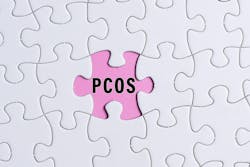People with polycystic ovary syndrome may be more likely to have memory and thinking problems in middle age, according to new research published in the January 31, 2024, online issue of Neurology, the medical journal of the American Academy of Neurology. The study does not prove that polycystic ovary syndrome causes cognitive decline. It only shows an association.
Other symptoms may include excess hair growth, acne, infertility and poor metabolic health.
The study involved 907 female participants who were 18 to 30 years old at the start of the study. They were followed for 30 years, at which time they completed tests to measure memory, verbal abilities, processing speed and attention.
At the time of testing, 66 participants had polycystic ovary syndrome.
In a test measuring attention, participants looked at a list of words in different colors and were asked to state the color of the ink rather than read the actual word. For example, the word “blue” could be displayed in red, so the correct response would be red.
Researchers found for this test, people with polycystic ovary syndrome had an average score that was approximately 11% lower compared to people without the condition.
After adjusting for age, race and education, researchers found that people with polycystic ovary syndrome had lower scores on three of the five tests that were given, specifically in areas of memory, attention and verbal abilities, when compared to those without this condition.
At years 25 and 30 of the study, a smaller group of 291 participants had brain scans. Of those, 25 had polycystic ovary syndrome. With the scans, researchers looked at the integrity of the white matter pathways in the brain by looking at movement of water molecules in the brain tissue.
Researchers found that people with polycystic ovary syndrome had lower white matter integrity, which may indicate early evidence of brain aging.

